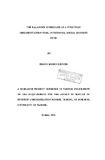| dc.contributor.author | Miano, Moses Kibuchi | |
| dc.date.accessioned | 2013-02-28T06:35:45Z | |
| dc.date.issued | 2011-10 | |
| dc.identifier.citation | MBA Thesis | en |
| dc.identifier.uri | http://erepository.uonbi.ac.ke:8080/xmlui/handle/123456789/12205 | |
| dc.description | The balanced scorecard as a strategic implementation tool in National Social Security
Fund | en |
| dc.description.abstract | A strategy is a plan of action that shows how any organization will develop a sustainable
competitive advantage with an intention of taking the organization to the next level of
success. The organizational strategy is by all means affected by the environment in which
the organization operates in since the environment is usually turbulent with different
levels and types of turbulence requiring different strategic plan of action. According to
Ansoff (1990) organizations must adapt new strategies to address new environmental
conditions. Crafting a strategy is only the beginning with the most critical part being the
implementation. A well formulated strategy poorly implemented will most certainly not
bear fruits for the organization. For a successful strategy implementation, there is need to
build the right capabilities and organizational culture. This study sought to gather
information on how balanced scorecard has been used as a strategic implementation tool
in NSSF. Different organizations across the globe have used different strategic
implementation tools such as key performance indicators, gap analysis, core competence
analysis and BSC. This research work concentrated on the balanced scorecard, a strategic
planning, implementation and management tool that not only helps in aligning the
organizations to their strategy but also helps in performance evaluation. The research
used NSSF as a case to help dig information that revealed that there is a three year
strategic plan that is reviewed as need arises. Data was collected mainly through an
interview guide and later analyzed by use of content analysis which helped extract the
key themes, concepts and arguments from the respondents. By using content analysis,
inferences were made by systematically and objectively identifying specified
characteristics. This research revealed that the organization in question have not greatly benefited form the implementation of balanced scorecard due to a number of hurdles.
One of such bottlenecks that hindered the organization from reaping the expected benefits
of using the BSC was the influence from the external environment and more so the
government. It was noted that if the political environment did not negatively affect
decision making in NSSF, benefits such as a holistic view of the organization, improved
customer service and a better tool for controlling strategic planning and implementation
would have been accrued by using BSC. After data collection and analysis, a summary,
conclusion and recommendations were made. The research was therefore a success. | en |
| dc.description.sponsorship | University of Nairobi | en |
| dc.language.iso | en | en |
| dc.subject | Balanced scorecard | en |
| dc.subject | Strategic implementation | en |
| dc.subject | National Social Security Fund | en |
| dc.title | The balanced scorecard as a strategic implementation tool in National Social Security Fund | en |
| dc.type | Thesis | en |
| local.embargo.terms | 6 months | en |
| local.publisher | School of Business, University of Nairobi | en |

